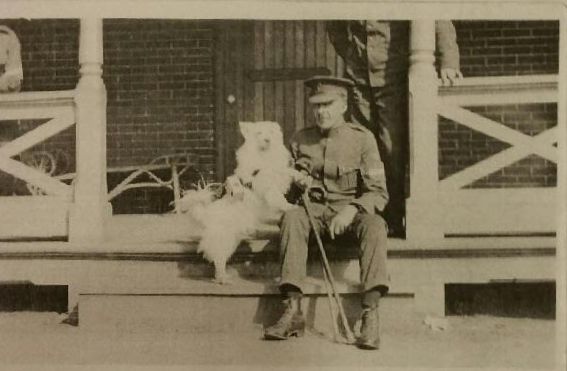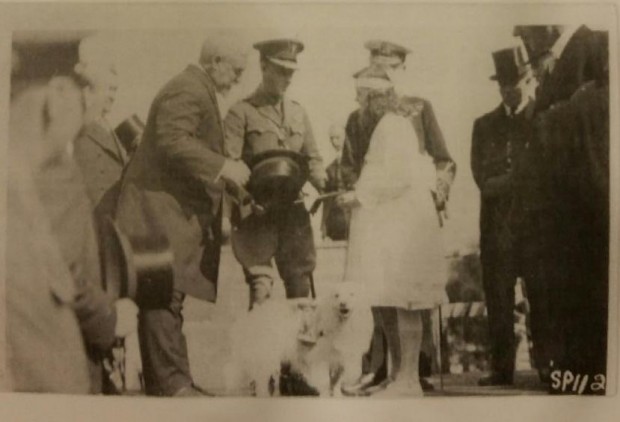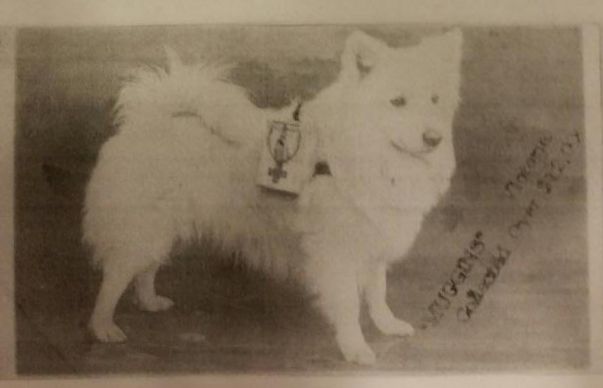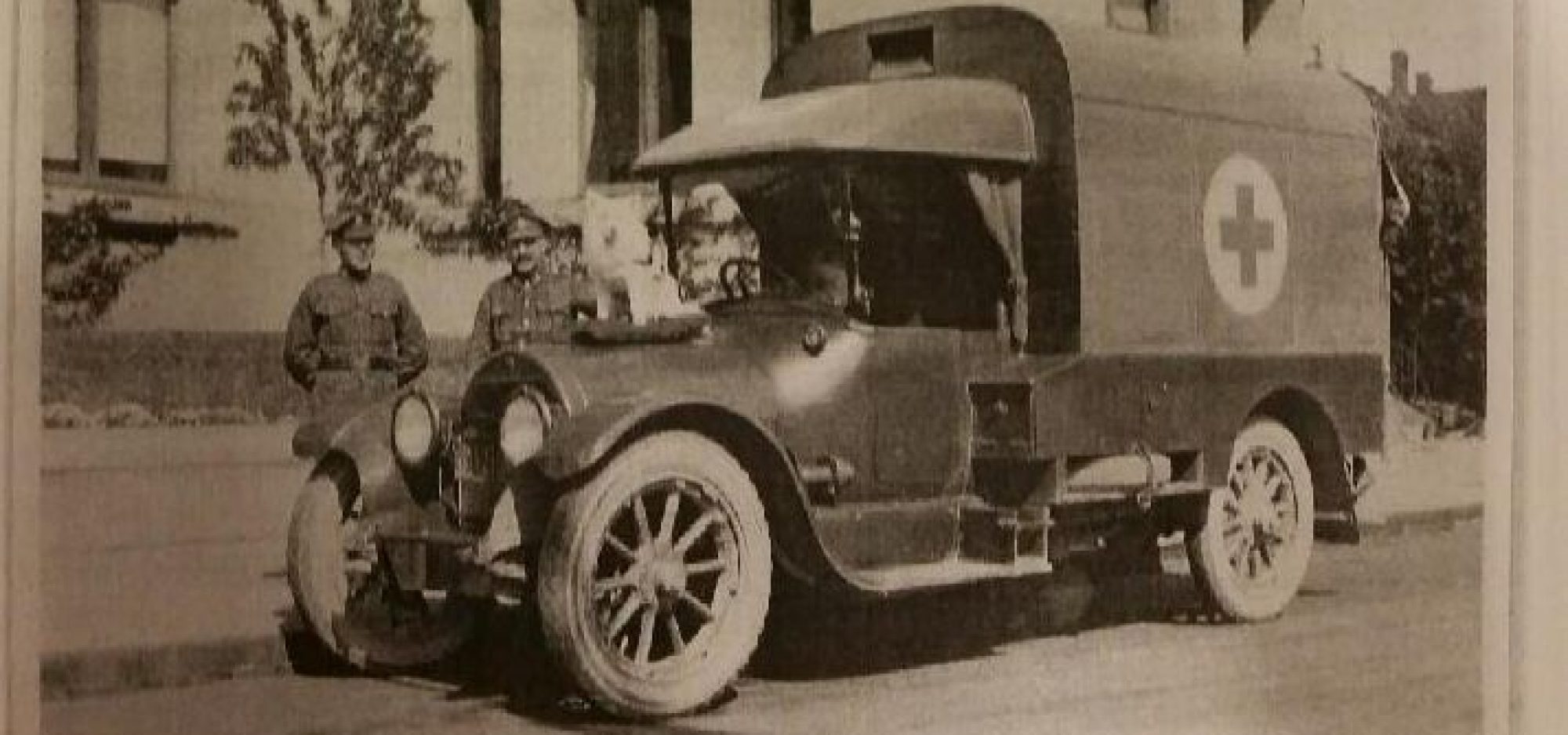Celebrity Status

As mentioned, Muggins was popular in the City of Victoria and his popularity seemed to transition into a celebrity-like persona. Many Victorians would ask to take pictures with the Red Cross mascot and one well-known Victorian by the name of Arthur Currie, also got his picture taken with the local celebrity. Lt. Col. Sir Arthur Currie commanded the Canadian Corps towards the end of the war, becoming the first Canadian to acquire the rank of general. This was not the only high profile meeting Muggins would have as he also got to meet the Prince of Wales.

Other than his local celebrity status, Muggins was also got recognition abroad. Mrs. Woodward, who was Muggins’ owner, had received many letters from other countries inquiring about the renowned fundraiser. The countries that mailed Mrs. Woodward ranged from: Belgium, France, Italy, Romania, Serbia, Japan, the United States and from nearly every corner of the British Empire. Letters were not the only way the local fundraiser was recognized abroad. During his fundraising, Muggins would regularly visit ferries and freight-liners arriving in Victoria and this allowed him to meet numerous oversea tourists who were interested in seeing the famous white Spitz. Muggins would go on to receive nine medals, with some coming from the United States and France. Although Muggins was awarded a total of nine medals, only seven have actually been found. Among these medals, Muggins received a medal from the Red Cross in recognition of his service to the organization. It is not easy to gain world recognition for fundraising, but Muggins was able to capture the hearts of the citizens of Victoria while at the same time attracting the attention of onlooking admirers living in other countries.
Fundraising

Muggins contributed greatly as to how the Red Cross decided raise money in the community during the Great War. He dedicated the majority of his life to the Red Cross, raising a remarkable $21,000, which would have been approximately $400,000 today. His pleasant demeanor and snowy white appearance was effective enough to convince the occasionally passer-by to donate by asking them to “dig down and cough up”. Muggins could be found fundraising on his own in downtown Victoria where donors were most likely to be found. Typically, a Red Cross volunteer in uniform tended to him and then he would be set free to tour the city with two Red Cross donation boxes attached to his back. Whenever his boxes got filled up he would always bring his donation boxes back to the Red Cross. Although walking around the City of Victoria yielded a fair amount of donations, this was not the only way Muggins worked. Some days, Muggins would be situated on top of a fundraising stand, which was commonly seen outside the Empress Hotel and at the wharf at the end of the causeway. He also attended tag days on special occasions in hopes of inspiring Victorians to give a little bit more. One characteristic that Muggins possessed which stood out amoung the rest was the dog’s dedication. No matter what time of year it was or whatever the weather looked like, Muggins would set out on his daily mission to collect as much money as possible for the Red Cross.
There was one special occasion in the summer of 1919 when Muggins received four one hundred dollar bills after boarding the “Empress of Asia”. The man behind this generous donation is not known but it was passed on to Muggins by Captain W. Davidson, who was the captain of the ship. The money from this donation would eventually go towards the construction of a billiard room at the Esquimalt Convalescent Hospital. This was the second largest sum Muggins has ever received from just one person, with the first being from an unknown individual who donated $500. It’s important to note that this took place in 1919, meaning that Muggins would still go around fundraising despite the end of the war. Even though the money would no longer be going to the injured troops overseas, it did however end up help funding community projects such as the one in Esquimalt.
References
Jenkins, Paul. “The Story of Muggins, the Red Cross Fundraising Dog.” Red Cross Canada. Last modified 9 October 2014. http://www.redcross.ca/blog/2014/10/the-story-of-muggins–the-red-cross-fundraising-dog.
Jenkins, Paul, and Van Kirk, Sylvia. “More Clues About Muggins, the Amazing Red Cross Dog.” Red Cross Canada. Last modified 30 November 2014. http://www.redcross.ca/blog/2014/11/more-clues-about-muggins–the-amazing-red-cross-dog.
Shanks, J. A. “The Life of a Dog.” The Daily Colonist (Victoria), 4 May 1919. http://archive.org/stream/dailycolonist61y120uvic#page/n13/mode/1up/search/muggins+red+cross.
“Muggins Career Ended by Pneumonia.” The Daily Colonist (Victoria). 15 January 1920. http://archive.org/stream/dailycolonist62y27uvic#page/n6/mode/1up/search/red+cross+muggins.
“Muggins Float.” The Daily Colonist (Victoria). May 5, 1919, 2. http://archive.org/stream/dailycolonist61y138uvic#page/n1/mode/1up/search/red+cross+parade+paraded.
“Passenger Gives Muggins Big Sum.” The Daily Colonist (Victoria). 12 July 1919. http://archive.org/stream/dailycolonist61y178uvic#page/n4/mode/1up/search/muggins+red.
